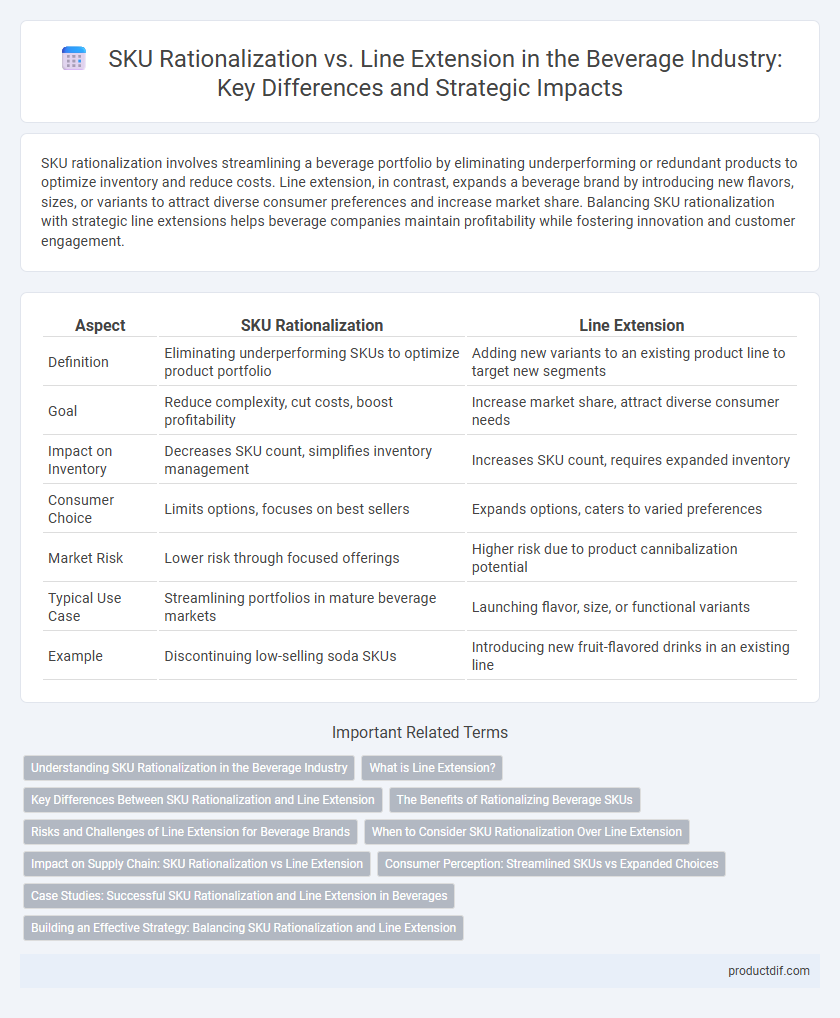SKU rationalization involves streamlining a beverage portfolio by eliminating underperforming or redundant products to optimize inventory and reduce costs. Line extension, in contrast, expands a beverage brand by introducing new flavors, sizes, or variants to attract diverse consumer preferences and increase market share. Balancing SKU rationalization with strategic line extensions helps beverage companies maintain profitability while fostering innovation and customer engagement.
Table of Comparison
| Aspect | SKU Rationalization | Line Extension |
|---|---|---|
| Definition | Eliminating underperforming SKUs to optimize product portfolio | Adding new variants to an existing product line to target new segments |
| Goal | Reduce complexity, cut costs, boost profitability | Increase market share, attract diverse consumer needs |
| Impact on Inventory | Decreases SKU count, simplifies inventory management | Increases SKU count, requires expanded inventory |
| Consumer Choice | Limits options, focuses on best sellers | Expands options, caters to varied preferences |
| Market Risk | Lower risk through focused offerings | Higher risk due to product cannibalization potential |
| Typical Use Case | Streamlining portfolios in mature beverage markets | Launching flavor, size, or functional variants |
| Example | Discontinuing low-selling soda SKUs | Introducing new fruit-flavored drinks in an existing line |
Understanding SKU Rationalization in the Beverage Industry
SKU rationalization in the beverage industry involves systematically evaluating and streamlining product offerings to eliminate underperforming or redundant SKUs, thereby optimizing inventory management and reducing operational costs. By focusing on high-performing SKUs, companies can enhance supply chain efficiency, improve shelf space allocation, and increase overall profit margins. This strategic approach contrasts with line extension, which increases product variety, often complicating inventory and diluting brand focus.
What is Line Extension?
Line extension in beverages involves introducing new flavors, formulations, or packaging variations within an existing product line to target different consumer preferences without launching a completely new brand. This strategy allows companies to leverage established brand equity while expanding market reach and shelf presence. Examples include adding a sugar-free variant or seasonal flavor to a popular soda brand.
Key Differences Between SKU Rationalization and Line Extension
SKU rationalization focuses on reducing the number of beverage products to optimize shelf space, minimize costs, and improve inventory turnover by eliminating underperforming SKUs. Line extension involves introducing new variations of an existing beverage brand to meet diverse consumer preferences, expand market reach, and increase brand loyalty. The key difference lies in SKU rationalization streamlining product offerings, whereas line extension broadens the product portfolio within the same brand.
The Benefits of Rationalizing Beverage SKUs
Rationalizing beverage SKUs reduces production complexity and lowers inventory costs by eliminating underperforming or redundant products. Streamlined SKU portfolios enhance supply chain efficiency, improve forecasting accuracy, and enable better allocation of marketing resources. This focused approach drives higher profit margins and accelerates innovation by concentrating efforts on best-selling beverages.
Risks and Challenges of Line Extension for Beverage Brands
Line extension in beverage brands poses significant risks such as brand dilution, where introducing too many variations can confuse consumers and weaken brand identity. Increased production complexity and supply chain challenges raise costs and impact efficiency, while cannibalization of existing products can reduce overall profitability. Maintaining consistent quality and meeting diverse consumer preferences across multiple SKUs also presents ongoing challenges.
When to Consider SKU Rationalization Over Line Extension
SKU rationalization should be considered when a beverage portfolio shows overlapping products that cannibalize sales and reduce overall profitability. It is essential if inventory costs and supply chain complexity rise due to excessive product variants. Opting for rationalization helps streamline offerings, improve cash flow, and enhance brand clarity compared to expanding the line with new SKU extensions.
Impact on Supply Chain: SKU Rationalization vs Line Extension
SKU rationalization streamlines the supply chain by reducing inventory complexity, lowering storage costs, and improving demand forecasting accuracy. Line extension increases product variety, which can complicate procurement, increase production changeovers, and elevate logistics expenses. Effective supply chain management balances SKU reduction with strategic product diversification to optimize operational efficiency and customer satisfaction.
Consumer Perception: Streamlined SKUs vs Expanded Choices
Streamlining SKUs enhances consumer perception by reducing choice overload, making it easier for buyers to identify and select preferred beverages quickly. SKU rationalization typically leads to improved shelf clarity and stronger brand focus, fostering customer trust and loyalty. Conversely, line extension offers expanded choices that cater to diverse tastes, but risks overwhelming consumers and diluting brand identity.
Case Studies: Successful SKU Rationalization and Line Extension in Beverages
Case studies in the beverage industry reveal that SKU rationalization often leads to a 15-30% reduction in production costs and a 10-20% increase in revenue by focusing on the top-performing SKUs. For example, Coca-Cola's SKU rationalization strategy streamlined their product portfolio, resulting in increased efficiency and market share growth. On the other hand, PepsiCo's line extension with new flavored variants expanded their market reach by 25%, demonstrating the potential for revenue growth through targeted innovation.
Building an Effective Strategy: Balancing SKU Rationalization and Line Extension
Balancing SKU rationalization and line extension requires a strategic approach that maximizes product diversity while minimizing inventory complexity and costs. SKU rationalization streamlines the beverage portfolio by eliminating underperforming SKUs, enhancing operational efficiency and shelf space optimization. Line extension leverages existing brand equity to introduce new flavors or packaging, driving incremental revenue growth without overwhelming the supply chain.
SKU Rationalization vs Line Extension Infographic

 productdif.com
productdif.com